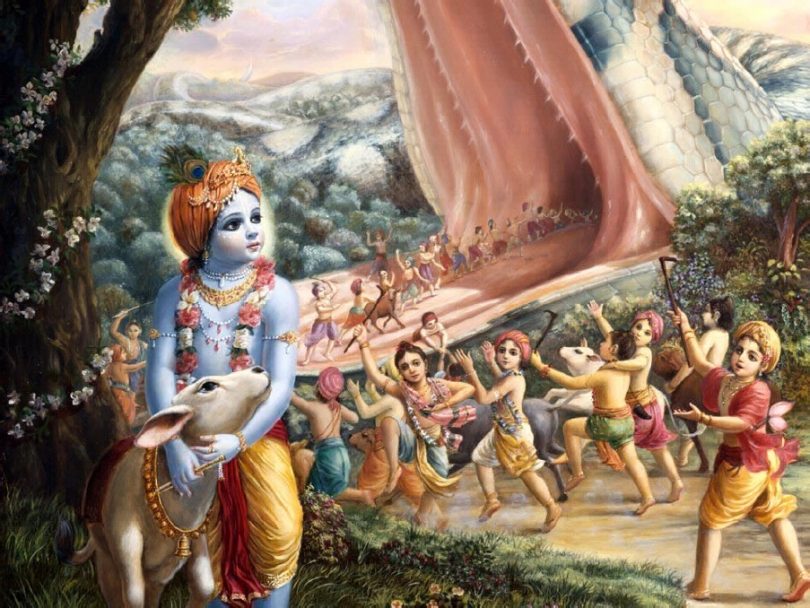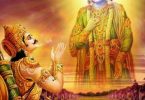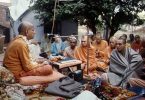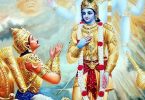Question 1:
In some cases, such as Putana and Aghasura, to give but two examples that come straight to mind, their destinations after being killed are clearly stated. In other cases, such as Trinavarta or Sakatasura, to give two other examples that come straight to mind, their destinations after being killed are not clearly described. In such cases where it isn’t explicitly described, at least in the 10th canto of the Srimad Bhagavatam, what should we presume in this regard?
Would we presume they achieved a personal liberation in some Vaikuntha planet, or some impersonal liberation in the Brahman, which often times happens to demons when they are killed by the Lord?
Of course, they may very well be other places or writings of the acharyas that I am not aware of that do explicitly describe the attainment of such demons.
Answer by Romapada Swami:
Answer to Question 1 is addressed inSrimad Bhagavatam 2.7.34-35:
“All demonic personalities like Pralamba, Dhenuka, Baka, Keçé, Ariñöa, Cäëüra, Muñöika, Kuvalayäpéòa elephant, Kaàsa, Yavana, Narakäsura and Pauëòraka, great marshals like Sälva, Dvivida monkey and Balvala, Dantavakra, the seven bulls, Çambara, Vidüratha and Rukmé, as also great warriors like Kämboja, Matsya, Kuru, Såïjaya and Kekaya, would all fight vigorously, either with the Lord Hari directly or with Him under His names of Baladeva, Arjuna, Bhéma, etc. And the demons, thus being killed, would attain either the impersonal brahma-jyoti or His personal abode in the Vaikuëöha planets.”
In his purport to these verses, Srila Visvanatha Cakravarti Thakura writes:
Some of these demons will attain säyujya and some will attain Vaikuëöha. Kharaù refers to Dhenuka, Darduraù refers to Baka. Ibha refers to Kuvalayäpéòa. Kuja means Narakäsura. Kapi means Dvivida. Samiti-çälinaù means those who shine in battle. Pralamba, Dhenuka, Dvivida, Balvala, and Rukmi were killed by Balaräma. Bhéma and Arjuna killed the Kämbojas and others. Pradyumna killed Çambara. Mucukunda killed Yavana. The Lord did not kill them. Thus their names are also mentioned in the phrase bala-pärtha-bhéma vyäjähvayena: they will attain liberation by the Lord who is also called Balaräma, Arjuna and Bhéma. Subdued by him, the seven bulls will attain liberation at another time (since they were animals). Among the demons Pralamba, Dhenuka and others will get säyujya and Pauëòraka, Dantavakra and others will get Vaikuëöha. This will be understood from later statements.”
Laghu Bhagavatamrta 3.55-57
Paräçara Muni’s prose answer to Maitreya is now summarized in verse:
Hiraëyakaçipu could not understand that the wonderful form of Lord Nåsiàha displayed by Lord Hari was actually Lord Viñëu. Hiraëyakaçipu was pious. He was sure that Lord Nåsiàha was very extraordinary, but because He was overcome with passion he could not fix his mind on Him. Because he was personally killed by the Lord, Hiraëyakaçipu attained extraordinary and rarely achieved sense-gratification and opulence in his next birth as Rävaëa.
Because he could not recognize Lord Nåsiàha as Lord Viñëu, and because he was not filled with hatred for Him, Hiraëyakaçipu was not fixed in meditation on the Lord. If without meditating on the Lord he had hated Him, he would have gone to hell, as King Veëa had gone. Because he was killed by the Lord’s own hand, he attained great good fortune.
3.60-64
Then he took birth as Çiçupäla, and again he attained great opulence. Because in that birth he chanted all the names of the goddess of fortune’s husband, Lord Näräyaëa, he could understand that Lord Viñëu had killed him twice. For this reason, out of great hatred he always chanted the Lord’s names and criticized Him in many ways.
Gazing at the Lord’s form, he became convinced that this was Lord Viñëu. Always and everywhere he remembered the Lord as he always chanted His names. In this way the great flood of sins born from his hatred of the Lord became burned up. When the Lord threw His cakra at the end, its splendor destroyed his demonic nature and purified his vision. Then he saw that the splendid Supreme Brahman had a humanlike form. Then the cakra destroyed his demon’s body and he merged into the Supreme Brahman.
[End]
Question 2 : A related question, I have also read that demons killed by Krishna Himself, such as the ones killed in Vrindavan, have a higher attainment, because they are killed by Krishna, and not an expansion such as Lord Narayana and others. I recall reading this in the Laghu Bhagavatamrita. Could you shed more light on this, specifically in the context of the demons Krishna killed in Vrindavan?
Answer by Romapada Swami:
2a. Krsna Sandarbha Anuccheda 29
“O lord who have appeared with your expansions to protect dharma! I brought the brähmaëa’s sons here because I wanted to see the two of you. As soon as you finish killing the demons who burden the earth, quickly make them come to me.” SB 10.89.59
‘Repeatedly (bhuyaù) killing all the demons who are a burden to the earth, you should quickly make them come to me (me anti). Having them come here, liberate them.’ It is well known that those killed by Kåñëa are liberated. Those who are liberated enter the light of Mahäviñëu. Hari-vaàça says brahma-tejomayaà divyaà mahad yad dåñöavän asi: that great, spiritual light of Brahman which you see is my eternal light.
~~~
Though Padma Puräëa says that Nåsiàha, Räma and Kåñëa have the six qualities of Bhagavän in full, it does not mean that they are equal. It indicates that among all avatäras they are the best. Generally, these three are considered the best of all. Among them however, according to the order, they are successively superior. Thus Kåñëa is supreme.
Maitreya asked why Hiraëyakaçipu was not liberated, whereas when he became Çiçupäla he was liberated. Paräçara explained the greater power of Kåñëa in comparison with Nåsiàha. Moreover, demons cannot attain liberation unless they meet Kåñëa. Other forms of the Lord do not give demons liberation. That is indicated by the word eva repeated twice in the Gétä:
tän ahaà dviñataù krürän saàsäreñu narädhamän |
kñipämy ajasram açubhän äsuréñv eva yoniñu ||
I cast those hateful, cruel, and lowest of humans, constantly doing evil, into repeated birth and death, in the wombs of demons.
äsuréà yonim äpannä müòhä janmani janmani |
mäm apräpyaiva kaunteya tato yänty adhamäà gatim ||
Taking birth as demons birth after birth, these fools, not attaining me, go to the lowest position, O son of Kunté. BG 16.19-20
In some scriptures it may be said that those who hate the Lord attain liberation by the power of thinking of him. But it is never said that all of the haters of the Lord are given liberation by the avatäras or their source (Viñëu). Thus Paräçara says that Kåñëa alone has additional powers for giving liberation to them. Previously noting that the cause of liberation is meeting the Lord endowed with great power directly, and remembering the liberation of Pütanä and others by Kåñëa, while worrying that Kälanemi and others did not get liberation (on being killed by other forms of the Lord), Paräçara says that this is the most astonishing nature of Bhagavän known as Kåñëa. In prose he says at the end:
“This Kåñëa, glorified and remembered, bestows the rarest results to both devatäs and demon, even by their connection through hatred. What to speak of giving results to those who are completely devoted.” Viñëu Puräëa 4.15.17
According to Bhägavatam, the two brothers had three births and should attain liberation from Kåñëa alone. Närada indicates this:
vaireṇa yaṁ nṛpatayaḥ śiśupāla-pauṇḍra-
śālvādayo gati-vilāsa-vilokanādyaiḥ
dhyāyanta ākṛta-dhiyaḥ śayanāsanādau
tat-sāmyam āpur anurakta-dhiyāṁ punaḥ kim
“Inimical kings like Çiçupäla, Pauëòraka and Çälva, while they were lying down, sitting or engaging in other activities, enviously meditated upon the bodily movements of the Lord, his sporting pastimes, and his loving glances. Being thus always absorbed in Kåñëa, they achieved positions in the spiritual world. What then can be said of the benedictions offered to those who constantly fix their minds on Lord Kåñëa in a favorable, loving mood?” SB 11.5.48
They all attain liberation by the great power of Kåñëa since he is able to attract the mind of a person who thinks of him somehow or other. Other forms of the Lord do not have this nature. Thus they do not liberate the demons. Veëa, though a hater of Viñëu, did not attain liberation since he was not absorbed in the Lord. Therefore, it is said tasmät kenäpy upäyena manaù kåñëe niveçayet: by some means one should concentrate the mind on Kåñëa. (SB 7.1.31)
Thus it should be concluded that Kåñëa has the most amazing çakti among all the forms of the Lord. By refuting contrary statements by making the statements favorable in meaning, the position of Kåñëa as Svayam Bhagavän is made stronger. In Vedänta-sütra as well, one sees that a statement in scripture is established by refuting various contrary statements. One should have faith that this is the same principle applied here.
2b. Krsna Sandarbha Anuccheda 35
Because Lord Kåñëa grants liberation even to the enemies killed by Him, He is unique among all the forms of the Personality of Godhead. This is confirmed by the following statement spoken by the Personified Vedas and repeated by Närada Muni in Çrémad-Bhägavatam (10.87.23):
“By practicing the mystic yoga system and controlling their breath, the great sages conquered the mind and senses. Thus engaging in mystic yoga, they saw the Supersoul within their hearts and ultimately entered into the impersonal Brahman. However, even the enemies of the Supreme Personality of Godhead attain that position simply by thinking of the Supreme Lord.”







